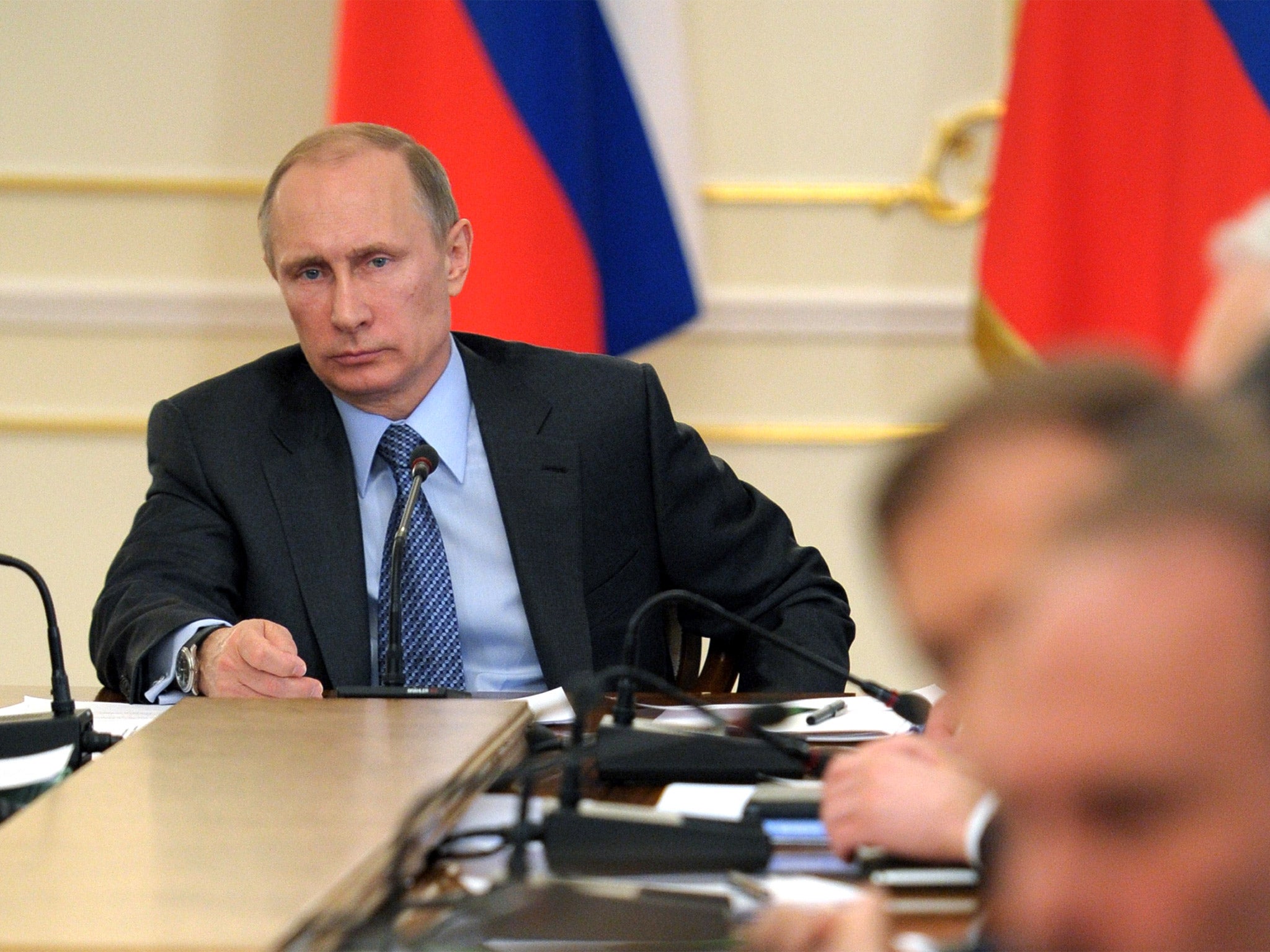Ukraine crisis: EU faces tough choices in the face of President Putin’s resolve
Action to back up threats could result in Russia turning off gas and oil supplies

When President Vladimir Putin addressed the Kremlin this week after his swift move to annex Crimea, it was with an unbending vision of a resurgent Russia standing up to a hypocritical West.
Dealing with vastly differing economic interests and clunking diplomatic procedures, European Union leaders meeting in Brussels on Thursday to formulate an appropriate response cannot hope to match Mr Putin’s speed or bluster. But diplomats and analysts say a united approach is more important than ever, warning that Moscow will not hesitate to exploit any splits that emerge.
As it became clear earlier this month that Mr Putin was not going meekly to accept the ousting of an ally in Kiev and the swearing-in of a pro-EU government, the bloc’s 28 heads of state drew up a plan of escalating reaction and retaliation to his military moves in Crimea.
Crimea referendum and independence
Show all 14As Mr Putin breached each condition – keeping troops in the peninsula, backing a referendum for its separation from Ukraine – the punitive measures were implemented, most recently on Monday when EU foreign ministers imposed travel bans and assets freezes on 21 Russian and Ukrainian officials.
Then came Mr Putin’s coup de théâtre at the Kremlin on Tuesday, with his blistering speech and signing of a decree to annex Crimea. Now the EU is faced with the difficult decision of whether to move to the last step in its plan, a step one EU diplomat referred to as “economic war”: tough sanctions which would strike at the heart of Russia’s business and trade relations.
Russia’s foreign ministry has vowed that any such moves “would not go without an adequate response”, and with many EU nations reliant on Russian energy supplies and others with carefully cultivated business and economic ties, it is not an empty threat. “ Sanctions are not cost-free for member states,” one British diplomat said.
David Cameron made clear that he will go into Thursday’s meeting pushing a tough line, including threatening Russia with permanent exclusion from the G8. Other nations are more cautious, particularly those that would suffer most if Moscow retaliated by turning off the taps on gas and oil supplies.
“It’s easy to say let’s introduce measures in the field of energy, then in Hungary, for example, we won’t be able to run our industry,” said a diplomat from Hungary, which relies on Russia for 80 per cent of its energy supplies. If the harshest sanctions were pursued, “we have to have measures and instruments to assist those members states who will be mostly exposed”, he added.
It is this need to balance the interests of all member states that will probably prevent a decision on harsher sanctions. One diplomat said Russia will aim to exploit any splits, making it even more important that the EU takes time to find a fair way to ensure that any sanctions hit evenly across all sectors such as energy, arms, agriculture and financial services.
The most likely concrete outcome of the meeting is the addition of a few more names to the sanctions list – potentially some oligarchs and members of Mr Putin’s inner circle. This may leave the EU open to accusations of weakness in the face of Mr Putin’s sabre-rattling, and analysts warn they should not prevaricate for too much longer.
“If the EU is willing to accept the increasing costs of the escalation, the first step should be to give a convincing signal of unity and determination – otherwise it will be seen as an invitation to test Europe’s strength,” Georg Zachmann, a research fellow at the Bruegel think-tank, wrote in a blog. “Taking incremental steps might take too long and would make the big steps look small.”
Russian ties: EU interests
UK
While there may be plenty of Russian money in British banks and in the mansions that line London’s parks, the Government has made it clear it is willing to take the financial pain to punish Russia for its incursions into Ukrainian territory. David Cameron said last week that while sanctions will have an impact, “the costs of not standing up to aggression are far greater”.
Cyprus and Spain
Other EU members that are home to sizeable Russian financial deposits such as Cyprus and Spain are in a more precarious economic position than the UK, and thus more cautious over harsh economic sanctions.
Finland
Also taking a softer approach are countries whose own territorial integrity could be threatened, such as Finland, which shares an 800-mile border with Russia.
Poland
However, joining Britain on the more hawkish side of the fence are nations scarred from their own bitter experiences under Soviet rule like the Baltic states and Poland.
France
Of the other big power players in Brussels, the French have their arms exports to consider. On Monday, France threatened to cancel a €1.2bn helicopter-carrier contract with Moscow over the Ukraine crisis, but has since discussed a “suspension” of the contract instead.
Germany
Berlin gets 40 per cent of its gas from Russia. Chancellor Angela Merkel has recently hardened her stance, but has been keen to emphasis continued dialogue as her preferred way of moving forward.
Bulgaria and Hungary
It is not Germany that will suffer the most if Russia decided to retaliate by turning off the taps. Bulgaria and Hungary depend on Russia for most of their energy supplies, and will probably be looking for some compensation from other EU nations if their economies suffered too severely from any sanctions.
Subscribe to Independent Premium to bookmark this article
Want to bookmark your favourite articles and stories to read or reference later? Start your Independent Premium subscription today.

Join our commenting forum
Join thought-provoking conversations, follow other Independent readers and see their replies